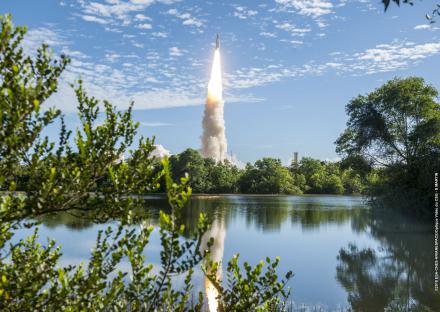Four new Galileo satellites were successfully launched from the European spaceport in Kourou, French Guiana on July 25, bringing the constellation to a total of 26 satellites, thereby enabling the provision of a more precise signal across a range of services.
Galileo's 10th launch, and the 3rd in a row with the  European Ariane 5 launcher, lifted off at 13:25 CEST on Arianespace’s Flight VA244 from Ariane Launch Complex No. 3 (ELA 3). With this launch the Galileo constellation comes one step closer to full operational capability, expected in 2020.
European Ariane 5 launcher, lifted off at 13:25 CEST on Arianespace’s Flight VA244 from Ariane Launch Complex No. 3 (ELA 3). With this launch the Galileo constellation comes one step closer to full operational capability, expected in 2020.
GSA and the Early Orbit Phase (EOP)
For the second time, the European GNSS Agency (GSA) is responsible for the Early Orbit Phase (EOP) of this mission, overseeing Spaceopal - a joint venture between Telespazio and DLR-GfR - in their role as Galileo Service Operator (GSOp) and EOP Mission Director, and CNES as EOP Operations Director. The EOP is one of the most important phases of a space mission during which the spacecraft is launched and put into the correct orbit and the first satellite elements are gradually switched on and tested.
“Today is an excellent opportunity to celebrate what Europe can achieve when resources, competences and commitments are brought together,” GSA Executive Director Carlo des Dorides said immediately after the launch. “Yet the success of Galileo is not measured by the number of satellites, but by the number of users, and here too we have achieved remarkable results. In the past 18 months, Galileo has moved from zero to 400 million users,” he said.
A unique European achievement
Elżbieta Bieńkowska, European Commissioner for Internal Market, Industry, Entrepreneurship and SMEs, called Galileo “a unique European achievement” and said that the latest launch would give both Galileo and the EU full worldwide coverage.
“It is now up to us - the GSA, and all our partners, to lead this revolution by working together across institutions and disciplines to overcome challenges and bring space closer to Earth, added des Dorides. “Because, we have proven once again that the sky is not the limit.”
About Galileo
Galileo is the EU’s Global Satellite Navigation System and has been providing positioning and timing services to around 400 million users since the launch of Initial Services in December 2016. It is a civilian system under civilian control and aims to ensure Europe’s independence from the other satellite navigation systems and its strategic autonomy in satellite navigation. Europe’s independence in this sector will help boost the European job market, ensure a more secure Union and support emerging technologies such as Artificial Intelligence and automated vehicles.
For more information on the launch, click here.
Media note: This feature can be republished without charge provided the European GNSS Agency (GSA) is acknowledged as the source at the top or the bottom of the story. You must request permission before you use any of the photographs on the site. If you republish, we would be grateful if you could link back to the GSA website (http://www.gsa.europa.eu).